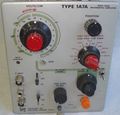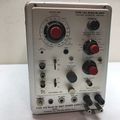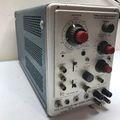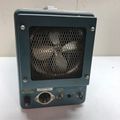1A7: Difference between revisions
No edit summary |
No edit summary |
||
| Line 77: | Line 77: | ||
[[Category:Introduced in 1966]] | [[Category:Introduced in 1966]] | ||
[[Category:500 series plugins]] | [[Category:500 series plugins]] | ||
[[Category:Differential amplifiers]] | |||
Revision as of 22:26, 20 July 2017
Template:Plugin Sidebar 2 The Tektronix Type 1A7 is a high-sensitivity differential plug-in for 500-series scopes. It senses down to 10 μV/Div, either AC or DC-coupled. It's possible to apply up to ± 300 mV offset to the reading while maintaining sensitivity. Upper and lower cutoff frequency is selectable on the front panel. Maximum bandwidth is 500 kHz, and common-mode rejection is 50,000 to 1.
Type 1A7's front end is a matched quad of 7586 nuvistors, with two in parallel - to reduce noise - on each input. These tubes are in temperature-equalizing housings, and mounted on a rubber-isolated subchassis. The "coarse" balance adjustment controls the relative heater voltages on the 7586's.
Type 1A7 was designed by John Addis and introduced in 1966.
Type 1A7A
In 1968, the 1A7 was superseded by the FET-equipped Type 1A7A (designed by Thor Hallen), which also doubled common-mode rejection and bandwidth (to 1 MHz).
The 1A7A's differential amplifier design was re-used with some modifications in the 3A9, 7A22, 5A22N, AM502, and 5030/5031. (26A2 too? - schematics needed)
Type 1A7A remained available until the end of the 500-series line after 1974.
Key Specifications
| Deflection | 10 μV/Div to 10 V/Div in 1–2–5 sequence |
|---|---|
| Input impedance | 1 MΩ // 47 pF (either input) |
| — 1A7 — | |
| Bandwidth | 1 MHz, LF limit switchable DC, 0.1 Hz to 10 kHz in ×10 steps, HF limit switchable 100 Hz to 100 kHz in ×3/×10 steps, and 500 kHz; AC coupling 1.6 Hz |
| — 1A7A — | |
| Bandwidth | 1 MHz, LF limit switchable DC, 0.1 Hz to 10 kHz in ×10 steps, HF limit switchable 100 Hz to 1 MHz in ×3/×10 steps, AC coupling 1.6 Hz |
| Signal ranges |
| Range | Differential signal | DC Offset | Common mode |
|---|---|---|---|
| 10 μV/Div to 10 mV/Div | ±0.4 V | ±0.4 V | ±10 V |
| 20 mV/Div to 0.1 V/Div | ±4 V | ±4 V | ±100 V |
| 0.2 V/Div to 1 V/Div | ±40 V | ±40 V | ±500 V |
| 2 V/Div to 10 V/Div | ±400 V | ±400 V | ±500 V |









